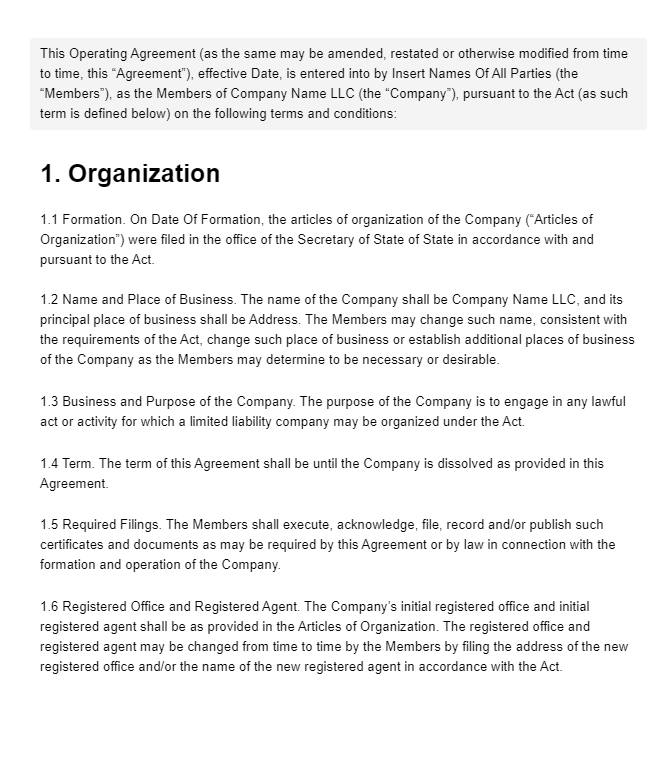Operating Agreement Template
Whether you're forming a limited liability company (LLC) or managing an existing one, having a well-drafted Operating Agreement is essential for outlining the structure, management, and operating procedures of the business. To access our Operating Agreement Template, click the button below. This template is vital for establishing clear guidelines, roles, responsibilities, and decision-making processes to ensure the smooth operation of your LLC.
Save time, avoid headaches, and ensure compliance effortlessly with current version of Operating Agreement Template. With our streamlined process, you'll have your form in hand within moments, giving you the peace of mind to focus on what truly matters – your business.

Understanding the Template
Download Your Operating Agreement Template Today
Are you tired of managing your LLC without clear guidelines and procedures in place? It's a challenging and risky process, isn't it? Spending valuable time addressing conflicts, resolving disputes, or worse, risking personal liability due to inadequate documentation. But what if there was a better way? Imagine having a downloadable Operating Agreement Template at your disposal, ready to customize with just a click. The Operating Agreement Template serves as a formal document outlining the governance and management structure of an LLC. Whether you're a single-member LLC or have multiple members, utilizing this template ensures clarity and protection for all parties involved. After downloading the template, make sure to customize it according to the specifics of your LLC and the needs of its members.How to Use the Template
Operating Agreement Template Instructions
In the designated sections of the template, you'll find prompts and guidelines for crafting a comprehensive operating agreement, including: Introduction: Start with an introductory section that identifies the LLC and its members. Include the full legal name of the LLC, the date of formation, and the names and addresses of all members. Purpose and Goals: Outline the purpose and goals of the LLC. Describe the business activities it will engage in and its objectives for growth and success. Management Structure: Specify the management structure of the LLC, including whether it will be member-managed or manager-managed. Describe the roles and responsibilities of members and managers, if applicable. Capital Contributions: Detail the capital contributions made by each member to the LLC. Specify the amount contributed by each member and the form in which contributions were made (e.g., cash, property, services). Distribution of Profits and Losses: Outline how profits and losses will be allocated among members of the LLC. Specify the percentage or proportion of profits and losses assigned to each member. Decision-Making Process: Describe the decision-making process for important matters affecting the LLC, such as amendments to the operating agreement, admission of new members, and distribution of assets upon dissolution. Dissolution and Termination: Include provisions for the dissolution and termination of the LLC, including the circumstances under which the LLC may be dissolved and the procedures for winding up its affairs. Once the agreement is customized to reflect the specific details of your LLC and the preferences of its members, it should be reviewed and signed by all members. Copies should be retained by each member for their records. It's crucial to ensure that all terms outlined in the agreement are clear, fair, and legally enforceable. Any amendments or modifications should be documented through formal channels and agreed upon by all members.Frequently Asked Questions
An Operating Agreement Template is a standardized document used to formalize the governance and management structure of a limited liability company (LLC). It outlines the rights, responsibilities, and relationships among LLC members, as well as the operating procedures and decision-making processes of the business.
Business owners forming an LLC or managing an existing one should use an Operating Agreement Template to establish clear guidelines for the operation and management of the business. Whether it's a single-member LLC or a multi-member LLC, having an operating agreement in place provides clarity and protection for all parties involved.
You can download the Operating Agreement Template for free from reputable sources like our website BlueNotary or from legal and business resources.
An LLC should review and potentially update its Operating Agreement annually or whenever significant changes occur, such as new members joining, changes in management, or shifts in business operations to ensure relevance and compliance.


